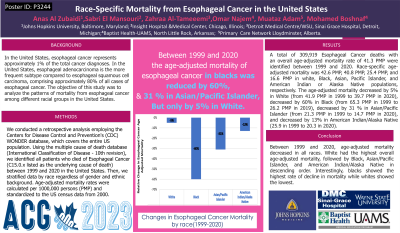Tuesday Poster Session
Category: Esophagus
P3244 - Race-Specific Mortality from Esophageal Cancer in the United States
Tuesday, October 24, 2023
10:30 AM - 4:00 PM PT
Location: Exhibit Hall

Has Audio
.jpg)
Zahraa Al-Tameemi, MD
DMC Sinai Grace Hospital
Detroit, MI
Presenting Author(s)
Anas Al Zubaidi, MD1, Sabri Elmansouri, MD, MPH2, Zahraa Al-Tameemi, MD3, Omer Najem, MD4, Muataz Adam, MD5, Mohamed Boshnaf, MD, MPH4
1Johns Hopkins Medicine, Baltimore, MD; 2Insight Hospital & Medical Center, Chicago, IL; 3DMC Sinai Grace Hospital, Detroit, MI; 4Baptist Health Medical Center-UAMS, North Little Rock, AR; 5Lloydminster Clinic, Lloydminster, AB, Canada
Introduction: In the United States, esophageal cancer represents approximately 1% of the total cancer diagnoses. In the United States, esophageal adenocarcinoma is the more frequent subtype compared to esophageal squamous cell carcinoma, comprising approximately 80% of all cases of esophageal cancer. The objective of this study was to analyze the patterns of mortality from esophageal cancer among different racial groups in the United States
Methods: We conducted a retrospective analysis employing the Centers for Disease Control and Prevention's (CDC) WONDER database, which covers the entire US population. Using the multiple cause of death database (International Classification of Disease - 10th revision), we identified all patients who died of Esophageal Cancer (C15.0.x listed as the underlying cause of death) between 1999 and 2020 in the United States. Then we stratified data by race regardless of gender, and ethnic background. Age-adjusted mortality rates were calculated per 1000,000 persons (PMP) and standardized to the US census data from 2000
Results: A total of 309,919 Esophageal Cancer deaths with an overall age-adjusted mortality rate of 41.3 PMP were identified between 1999 and 2020. Race specific age-adjusted mortality were 42.6 PMP, 40.8 PMP, 25.4 PMP, & 16.6 PMP in white, Black, Asian or Pacific Islander, & American Indian or Alaska native populations, respectively. The age-adjusted mortality decreased by 5% in White (from 41.9 PMP in 1999 to 39.7 PMP in 2020), decreased by 60% in Black (from 65.3 PMP in 1999 to 26.2 PMP in 2019), decreased by 31 % in Asian/Pacific Islander (from 21.3 PMP in 1999 to 14.7 PMP in 2020), and decreased by 13% in American Indian/Alaska Native (25.9 in 1999 to 20.3 in 2020)
Discussion: Between 1999 and 2020, age adjusted mortality decreased in all races. White had the highest overall age adjusted mortality, followed by Black, Asian/Pacific Islander, & American Indian/Alaska native in descending order. Interestingly, Black showed the highest rate of decline in mortality while White showed the lowest
Disclosures:
Anas Al Zubaidi, MD1, Sabri Elmansouri, MD, MPH2, Zahraa Al-Tameemi, MD3, Omer Najem, MD4, Muataz Adam, MD5, Mohamed Boshnaf, MD, MPH4. P3244 - Race-Specific Mortality from Esophageal Cancer in the United States, ACG 2023 Annual Scientific Meeting Abstracts. Vancouver, BC, Canada: American College of Gastroenterology.
1Johns Hopkins Medicine, Baltimore, MD; 2Insight Hospital & Medical Center, Chicago, IL; 3DMC Sinai Grace Hospital, Detroit, MI; 4Baptist Health Medical Center-UAMS, North Little Rock, AR; 5Lloydminster Clinic, Lloydminster, AB, Canada
Introduction: In the United States, esophageal cancer represents approximately 1% of the total cancer diagnoses. In the United States, esophageal adenocarcinoma is the more frequent subtype compared to esophageal squamous cell carcinoma, comprising approximately 80% of all cases of esophageal cancer. The objective of this study was to analyze the patterns of mortality from esophageal cancer among different racial groups in the United States
Methods: We conducted a retrospective analysis employing the Centers for Disease Control and Prevention's (CDC) WONDER database, which covers the entire US population. Using the multiple cause of death database (International Classification of Disease - 10th revision), we identified all patients who died of Esophageal Cancer (C15.0.x listed as the underlying cause of death) between 1999 and 2020 in the United States. Then we stratified data by race regardless of gender, and ethnic background. Age-adjusted mortality rates were calculated per 1000,000 persons (PMP) and standardized to the US census data from 2000
Results: A total of 309,919 Esophageal Cancer deaths with an overall age-adjusted mortality rate of 41.3 PMP were identified between 1999 and 2020. Race specific age-adjusted mortality were 42.6 PMP, 40.8 PMP, 25.4 PMP, & 16.6 PMP in white, Black, Asian or Pacific Islander, & American Indian or Alaska native populations, respectively. The age-adjusted mortality decreased by 5% in White (from 41.9 PMP in 1999 to 39.7 PMP in 2020), decreased by 60% in Black (from 65.3 PMP in 1999 to 26.2 PMP in 2019), decreased by 31 % in Asian/Pacific Islander (from 21.3 PMP in 1999 to 14.7 PMP in 2020), and decreased by 13% in American Indian/Alaska Native (25.9 in 1999 to 20.3 in 2020)
Discussion: Between 1999 and 2020, age adjusted mortality decreased in all races. White had the highest overall age adjusted mortality, followed by Black, Asian/Pacific Islander, & American Indian/Alaska native in descending order. Interestingly, Black showed the highest rate of decline in mortality while White showed the lowest
Disclosures:
Anas Al Zubaidi indicated no relevant financial relationships.
Sabri Elmansouri indicated no relevant financial relationships.
Zahraa Al-Tameemi indicated no relevant financial relationships.
Omer Najem indicated no relevant financial relationships.
Muataz Adam indicated no relevant financial relationships.
Mohamed Boshnaf indicated no relevant financial relationships.
Anas Al Zubaidi, MD1, Sabri Elmansouri, MD, MPH2, Zahraa Al-Tameemi, MD3, Omer Najem, MD4, Muataz Adam, MD5, Mohamed Boshnaf, MD, MPH4. P3244 - Race-Specific Mortality from Esophageal Cancer in the United States, ACG 2023 Annual Scientific Meeting Abstracts. Vancouver, BC, Canada: American College of Gastroenterology.
